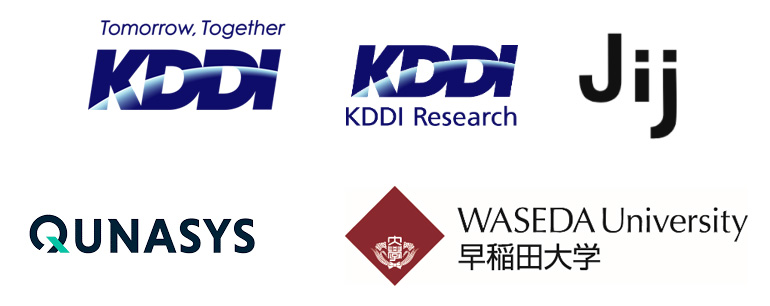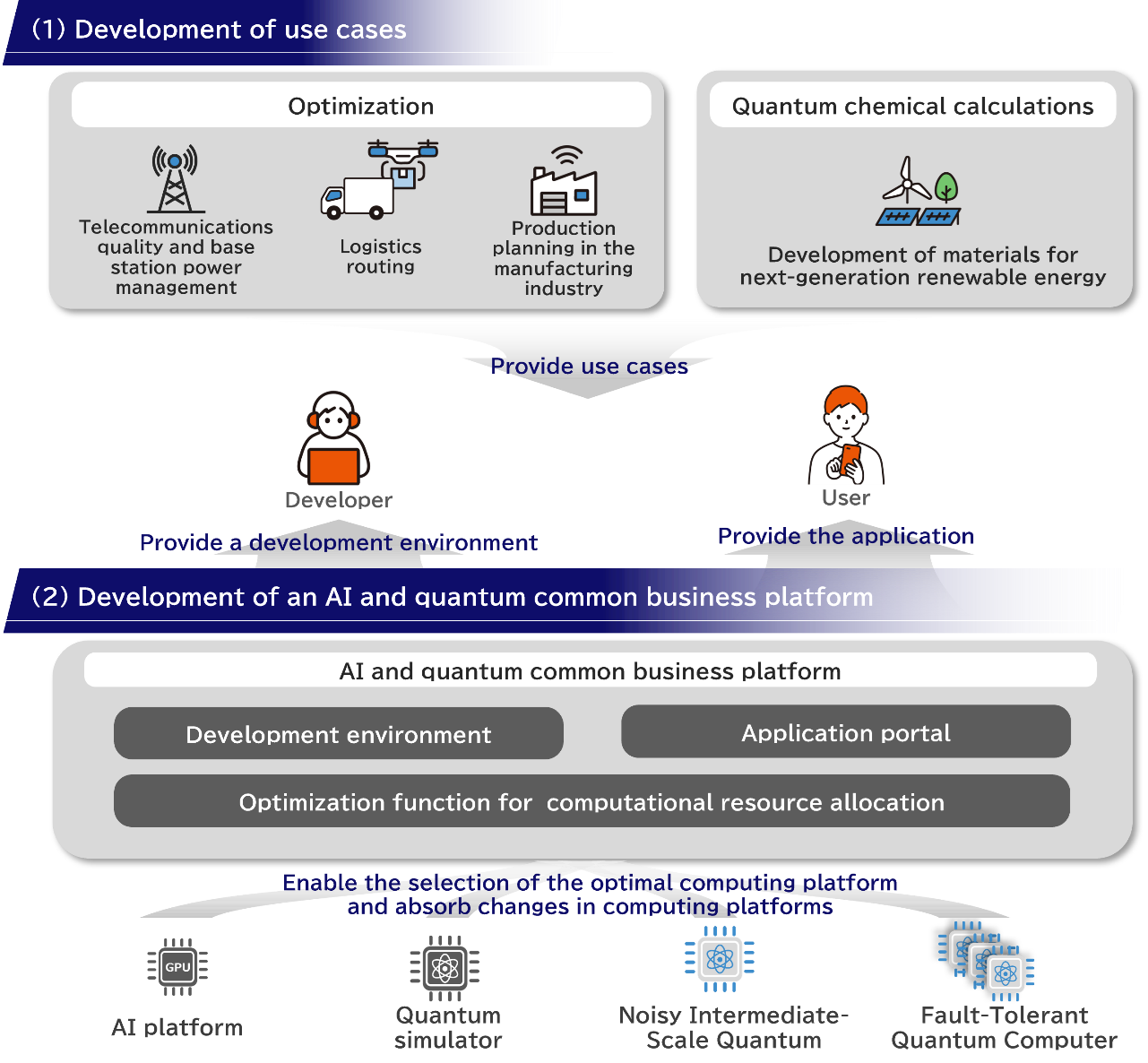KDDI, KDDI Research, Jij, QunaSys, and Waseda University Form Partnership to Build AI and Quantum Common Platform
―Initiating efforts toward expanding quantum computer use cases and commercialization―
KDDI Corporation
KDDI Research, Inc.
Jij Inc.
QunaSys Inc.
Waseda University
KDDI Corporation, KDDI Research, Inc., Jij Inc., QunaSys Inc., and Waseda University agreed to form a partnership regarding the technological development and commercialization of quantum computers on February 27, 2025.
From now on, to dramatically improve the performance of wide-spreading AI by integrating it with quantum computing, they will develop an AI and quantum common business platform that seamlessly connects AI and quantum computing, expand use cases utilizing the platform, and make concrete efforts (hereinafter referred to as "these efforts") toward the commercialization of quantum computers.


■Expectations and challenges regarding quantum computers
- As the use of generative AI, such as large language models (LLMs), is rapidly spreading, it has become clear that the computing power and processing speed of conventional (classical) computers have limitations. To address these challenges, quantum computers have attracted attention in recent years as a new technology with the potential to accelerate the evolution of AI.
- A quantum computer has unparalleled computing power that allows it to perform multiple calculations simultaneously, taking advantage of quantum properties, and can process complicated calculations, including combinatorial optimization problems that are difficult for classical computers to solve. Moreover, the integration of AI and quantum computers is expected to enable the analysis of more complex data sets and the development of new algorithms, dramatically improving the performance of AI.
- On the other hand, the development of practical use cases presents a significant barrier for the entire industry. In the "Vision of Quantum Future Society" by the Cabinet Office [
 1], it is emphasized that efforts to find and create use cases for users to utilize the quantum technology are important.
1], it is emphasized that efforts to find and create use cases for users to utilize the quantum technology are important. - Research and development activities for quantum computers have chiefly been carried out by Big Tech and startups. Until now, the methods for implementing large-scale quantum bits and quantum chips [
 2] have yet to be established. Due to the variety of approaches to research and development, it is difficult to predict the future mainstream technology, creating problems for companies and organizations considering the use of quantum computers in the future.
2] have yet to be established. Due to the variety of approaches to research and development, it is difficult to predict the future mainstream technology, creating problems for companies and organizations considering the use of quantum computers in the future.
■About the partnership among KDDI and its partners
1. Past efforts
- KDDI and KDDI Research have made early efforts to find and create use cases for quantum technology, chiefly in the telecommunications field. Specifically, they have gained expertise in quantum technology through efforts such as optimizing base station settings to improve telecommunications quality [
 3] and conducting demonstration research on automating shift plan creation for the au contact center [
3] and conducting demonstration research on automating shift plan creation for the au contact center [ 4].
4]. - KDDI Research, Jij, QunaSys, and Waseda University have joined the third term of the Strategic Innovation Promotion Program (SIP) named "Promoting Application of Advanced Quantum Technologies to Social Challenges" (hereinafter referred to as "SIP3 quantum") [
 5]. They will continuously cooperate with other companies and universities to find and create use cases for quantum technology, develop benchmark (evaluation) software for quantum computers, and create a testbed use environment.
5]. They will continuously cooperate with other companies and universities to find and create use cases for quantum technology, develop benchmark (evaluation) software for quantum computers, and create a testbed use environment.
2. About these efforts
- In these efforts, KDDI and its partners will combine the expertise of KDDI and KDDI Research, which have focused their efforts on finding and creating use cases for quantum computers in the telecommunications field, with the expertise and underlying technologies of Jij, QunaSys, and Waseda University. These partners have led research and development in the industry and possess strengths in optimization and chemical calculations, areas where early commercialization through quantum computing is expected.
- KDDI and its partners are planning to make these efforts in conjunction with a quantum-classical hybrid testbed environment, which is being built by the Global Research and Development Center for Business by Quantum-AI Technology (G-QuAT) of the National Institute of Advanced Industrial Science and Technology.
- In addition, KDDI and its partners are considering expanding these efforts beyond Japan, with SIP3 quantum currently strengthening cooperation with Europe. Through this connection, KDDI and its partners will invite European quantum-related companies to participate in these efforts.
- Going forward, KDDI and its partners will make the following efforts to expand use cases for quantum computers and accelerate their fusion with AI, contributing to the realization of a new society that fully utilizes the capabilities of quantum computers.
- (1) Development of use cases
- To identify the industry fields where quantum computers can be effective, KDDI and its partners will develop use cases chiefly in the optimization and chemical calculation fields, where early commercialization is expected.
- In the optimization field, use cases related to telecommunications―KDDI’s core business―will include the optimization of telecommunications quality and base station energy management. In fields outside of telecommunications, potential use cases will include the optimization of logistics routing and production planning in the manufacturing industry.
- In the chemical calculation field, potential use cases include the development of materials for next-generation renewable energy.
- (2) Development of an AI and quantum common business platform
To implement quantum computers in society, it is necessary to build an environment that allows users to seamlessly connect AI platforms, which have already been socially implemented on classical computers, to quantum computers without being aware of the border between classical and quantum systems. Going forward, KDDI and its partners will speed up development, aiming to build an AI and quantum common business platform that will provide the following functions:
<Functions to be provided (planned)>
- A function that distinguishes users from developers of applications on quantum computers, providing mechanisms similar to classical computer APIs and application portals. This will make it easier for users who are not familiar with quantum computing to utilize the computing power of quantum computers.
- A function that enables the platform to absorb technological changes and differences produced by the evolution of AI platforms and quantum computing platforms. This will allow each application to choose the optimal computing resources, as it is conceivable that the platforms will evolve year after year.

<Overview of future efforts>
3. Roles of each party
| Company/university | Roles |
|---|---|
| KDDI |
|
| KDDI Research |
|
| Jij |
|
| QunaSys |
|
| Waseda University |
|
(References)
■About Jij
Jij is a startup whose mission is to make society calculatable to contribute to the progress of humankind. It focuses on optimization calculations involving large-scale calculations. JijZept, a next-generation software development platform utilizing quantum optimization technology, is used in the U.K., U.S., Germany, Singapore, Japan, and other countries. It enables the realization of efficient and highly precise development solutions for planning tasks, such as energy supply-and-demand planning and production planning in the manufacturing industry, by combining proprietary algorithms with the latest software technology.
■About QunaSys
QunaSys is a company pursuing the research and development of algorithms and software that utilize quantum computers. The company has made groundbreaking achievements, especially in quantum chemical calculations, and has also been devoting its efforts toward the development of algorithms for computer-aided engineering (CAE). In addition, QunaSys provides QURI SDK, a development environment for quantum computers, to allow anyone to easily implement quantum algorithms, aiding in research on quantum computing utilizing emulators and resource estimation technology.
- [1]
- [2]A quantum bit is a unit of information processed by a quantum computer. A quantum chip is the hardware that performs calculations using quantum bits. A quantum bit has a property that allows it to exist in a superposition of multiple states, 0 and 1, simultaneously, enabling it to process more information at one time.
- [3]
- [4]
- [5]
- *The information contained in the articles is current at the time of publication.
Products, service fees, service content and specifications, contact information, and other details are subject to change without notice.
Downloads
